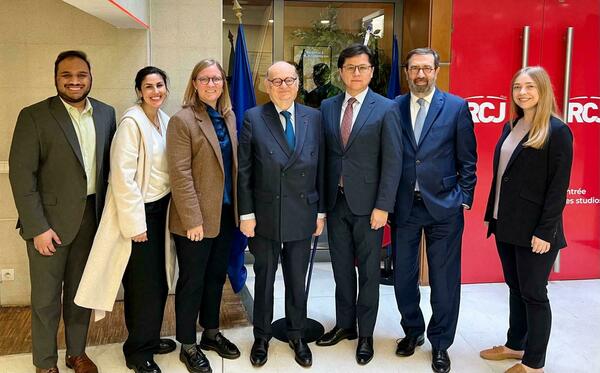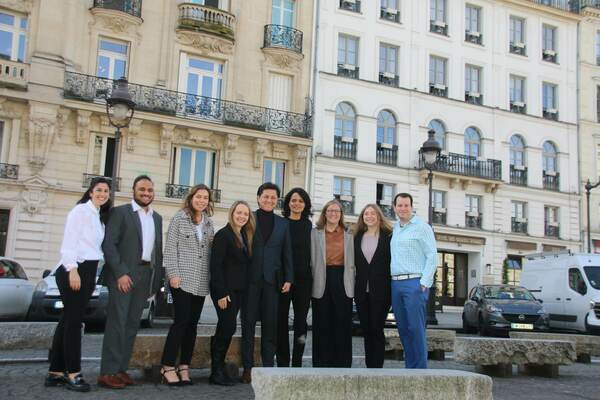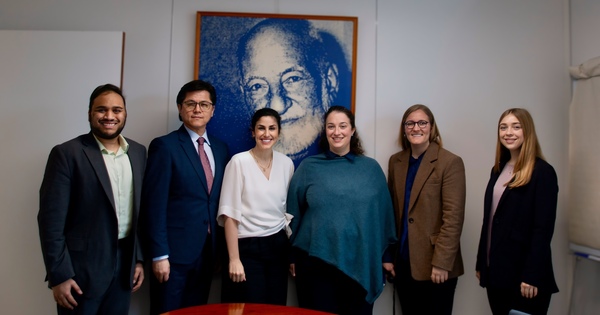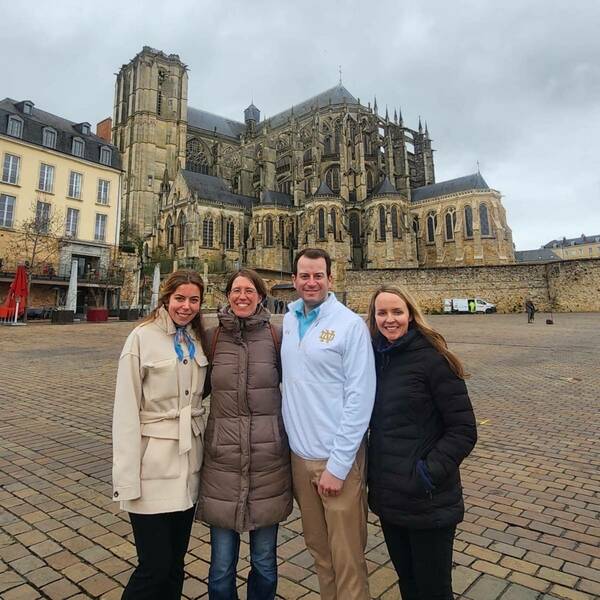
Over spring break from March 9-14, representatives from the Notre Dame Law School Religious Liberty Initiative, United States Commission on International Religious Freedom, and Bellwether International traveled to France to explore religious freedom issues in the country.
The delegation to France included Dean G. Marcus Cole (Joseph A. Matson Dean and Professor of Law), Professor Stephanie Barclay (faculty director, Notre Dame Law School's Religious Liberty Initiative), Nury Turkel (former chair, United States Commission on International Religious Freedom), Rachel Miner (founder and CEO, Bellwether International), Kimberlie Orr (international legal fellow, Notre Dame Law School's Religious Liberty Clinic), and Religious Liberty Clinic student fellows Andrew Olson, Emma Kate Lively, Holly Fulbright, and Rohan Vaidya.
The France delegation met with several key stakeholders working in the intersection of law, policy, and culture, from government officials to civil society groups to leading public intellectuals.

“Diplomacy is one of the most powerful tools for influencing adherence to international laws and norms,” said Orr. “Delegations allow our students to see diplomacy in action alongside influential world leaders.”
The delegation aimed to identify laws and policies in France that limit religious freedom and to understand the rise of Islamophobia and antisemitism, and its implications for international religious freedom. Through fulfilling these objectives, the delegation gained a deep and comprehensive understanding of the ways in which the Muslim and Jewish communities in France are impacted by complex socio-religious issues, and discriminatory laws and policies.
“France is a bellwether, an indicator of trends, for Europe and other key voices in the global struggle to protect human rights, including freedom of religion or belief,” said Miner. “It is crucial that France continue to use their unique approach of laïcité (the constitutional principle of secularism in France), to represent their religious minorities, including Muslims and Jews who continue to be targeted for their faith.”
“In seeking to learn more about the rise of antisemitism and Islamophobia in France, I was able to gain a deeper understanding of France's conception of religious liberty and how that differs in very fundamental ways from the American concept of religious liberty,” added Vaidya, a student fellow in the Global Religious Persecution & Immigration section of the Religious Liberty Clinic. “I learned how important it is that, as advocates for religious freedom, we seek to truly understand the perspectives of those whom we wish to advocate for, rather than imposing our own preconceived notions of what religious liberty means.”
At the start of the trip, the delegation enjoyed dinner with Bernard-Henri Lévy, a philosopher and commentator who is considered one of the founders of the Nouveaux Philosophes (New Philosophers) school of philosophy. They discussed the impact of laïcité on religious expression in French culture and the self-understanding of religious people under a state explicitly committed to secularism in the public sphere.
“Before the trip, I spent many hours researching laïcité,” said Lively, a student fellow in the Transactional Advising section of the Religious Liberty Clinic. “While my research had provided me with an idea of this concept, interviews during the delegation to France shed light on just how much France's history and current political climate inform the concept of laïcité. This realization opened my eyes to the ways I had structured my research on preconceived notions about the relationship between the church and the state.”

The delegation met with Dr. Haïfa Tlili, a researcher and activist who focuses on empowering women, especially those who face discrimination for wanting to wear religious garb in public.
Dr. Tlili works to support Les Hijabeuses, a group of French women who want to wear the hijab while playing soccer. For Tlili, who does not wear the hijab herself, it is a matter of principle that French society should accept the sincere conscientious desires of these women. Tlili aims to foster more understanding of and representation for Muslim women in French culture.
“No one should face discrimination because of their faith or encounter restrictions in practicing their religion freely,” said Turkel. “It is truly gratifying to be part of this important cause to promote and protect religious liberty.”
The delegation also met with Rabbi Moshe Sebbag, the Chief Rabbi of the Grand Synagogue of Paris, to discuss the experiences of Sebbag’s congregants and contemporary challenges faced by French Jews. They also spoke about the impact of laïcité on the ability of religious groups to organize themselves, receive legal recognition, and maintain property, with particular attention to concerns that may be unique to Jews. Sebbag gifted the delegation with a Jewish prayer book found during the Nazi occupation in France.

Fulbright and Vaidya had the opportunity to speak with Cécile Riou, the Deputy Secretary General of the National Consultative Commission on Human Rights (CNCDH), about Islamophobia and antisemitism in France. The delegation sought to understand how human rights in France have changed over time, and how Riou's leadership in the CNCDH has impacted her view of the future of human rights.
“I was alarmed to learn that anti-Muslim and antisemitic acts have become more common due to many factors, including the rise of the far right and far left,” said Fulbright, a student fellow in the Global Religious Persecution & Immigration section of the Religious Liberty Clinic. “I was also surprised to learn that individuals convicted of anti-Muslim or antisemitic acts may be sent to ‘internships’ rather than prison.”
Olson and Lively visited the Archbishop of Paris and Jean Chausse, the CEO for Economic Matters for the Roman Catholic Church in Paris. They discussed the status of church-state relations in France since the time of the French Revolution.
“Coming to understand how the French policy of laïcité works in practice and how people of all different religions experience and perceive it has given me a new perspective on the very particular church-state balance that we take for granted in America under the First Amendment,” said Olson, a student fellow in the Transactional Advising section of the Religious Liberty Clinic.
“Studying religious liberty issues in France provided Notre Dame law students with an amazing opportunity to learn about the cultural and historical influences that have shaped each country's approach to church-state relations,” said Brendan Wilson, who leads the transactional component of Notre Dame Law School's Religious Liberty Clinic.
The delegation also met with Michel Picaud, the president of Friends of Notre-Dame de Paris, an organization that has raised hundreds of millions of euros to support the restoration of the Notre-Dame de Paris. He gave an extensive presentation on the 2019 cathedral fire and the restoration efforts since then.

In addition to their meetings, Barclay and student fellows Lively and Olson, visited Notre Dame de Sainte Croix and the Cathedral of Saint Julian of Le Mans, which are both Catholic churches located in Le Mans, France. There, they met with Fr. Romuald Fresnais, C.S.C., who further explained the history of the church-state relationship in France and the effect of laïcité on contemporary Catholicism in France.
The France delegation also met with Jack Lang, president of the Arab Institute; the Representative Council of Jewish Institutions in France; Olivier Faure, first secretary of the Socialist Party; Hassen Chalghoumi, imam of the Drancy mosque; and Dr. Karim Ifrak Ahmed, a researcher at the National Center for Scientific Research.
The Religious Liberty Clinic student fellows expressed that being able to participate in the international delegation to France was life-changing and one of the highlights of their experience thus far at Notre Dame Law School.
Reflecting upon the trip, Vaidya concluded, “The success of our delegation is a testament to the Notre Dame Law School Religious Liberty Initiative's commitment to working for real change in every corner of the world.”
About the Notre Dame Law School Religious Liberty Initiative
Established in 2020, the Notre Dame Law School Religious Liberty Initiative promotes and defends religious freedom for all people through advocacy, formation, and thought-leadership. The initiative protects the freedom of individuals to hold religious beliefs as well as their right to exercise and express those beliefs and to live according to them.
The Religious Liberty Initiative has represented individuals and organizations from an array of faith traditions to defend the right to religious worship, to preserve sacred lands from destruction, to promote the freedom to select religious ministers, and to prevent discrimination against religious schools and families.
Learn more about the Religious Liberty Initiative at religiousliberty.nd.edu.